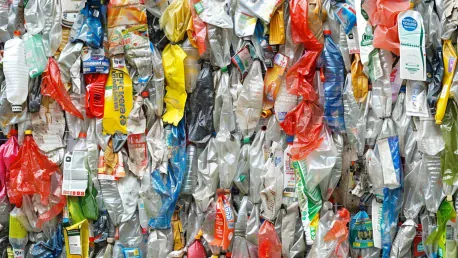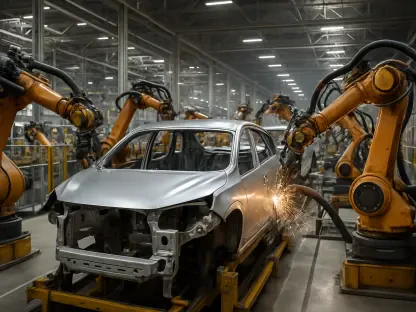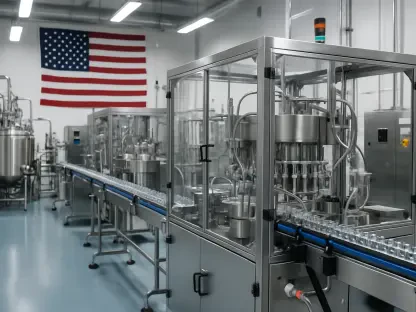Plastic has long been vilified in the conversation about environmental sustainability. However, a recent dialogue hosted by ALPLA, a packaging and recycling specialist in Berlin, has highlighted a more nuanced perspective. This article explores the role plastic can play in a sustainable circular economy, bringing insights from industry leaders, politicians, and academics.
Reframing Plastic’s Role
Promoting a Fact-Based Dialogue
Plastic is often viewed negatively in public discourse, but this perspective lacks nuance. According to experts at the ALPLA event, plastic can significantly contribute to a circular economy. Moving away from an emotional debate to a fact-based dialogue can help illuminate plastic’s potential benefits, especially in the realm of recyclability and climate protection. The discussion emphasized that while plastic pollution is a grave concern, the material itself is not inherently detrimental. Rather, it is the mismanagement and improper disposal of plastic that exacerbates environmental issues.
By focusing on plastic’s lifecycle, the conversation shifts to how it can be managed in a way that mitigates its ecological footprint. Experts pointed out that plastic, when recycled and reused effectively, can reduce the need for virgin resources, thus protecting the environment. The key is to create systems and frameworks that facilitate efficient recycling and raise public awareness about these processes.
Plastic as a Valuable Resource
Plastic is incredibly versatile and recyclable, opening avenues for its reuse in numerous applications. The potential for plastic to be part of a closed-loop system, where it is continuously reused and recycled, can reduce the need for virgin materials. By focusing on plastic’s reusability, we can create a more sustainable resource management system. The dialogue underscored the importance of viewing plastic not just as waste but as a valuable resource that can be harnessed for future use.
Several industry leaders at the event cited examples of innovative uses of recycled plastic, such as its application in creating robust and durable products, from consumer goods to construction materials. These adaptations signal a shift towards more sustainable practices wherein plastic waste is minimized, and its lifecycle is extended. This paradigm encourages industries to invest in recycling technologies and design products that are easier to recycle.
Collaborative Efforts and Technological Innovations
Collaborative Efforts Are Essential
Achieving a circular plastic economy requires collaborative efforts across various sectors. At the ALPLA dialogue, experts emphasized the importance of cooperation between industries, governments, and educational institutions. Such partnerships can lead to innovative solutions and promote public understanding of plastic’s role in sustainability. Politicians, business leaders, and academic professionals all contributed to a cohesive vision for a more sustainable approach to plastic management.
These collaborations also extend to international efforts, where countries share best practices and technological advancements to improve global recycling capabilities. The dialogue highlighted successful case studies where cross-sector partnerships resulted in significant advancements in recycling infrastructure and public participation. By working together, stakeholders can create an ecosystem that supports the sustainable lifecycle of plastic, ensuring every piece of plastic is accounted for and reused.
The Role of Technological Innovations
Innovation in recycling technologies, such as mechanical recycling and the ‘Design for Recycling’ approach, is crucial. These advancements not only enhance the quality and efficiency of recycling processes but also help in gaining consumer trust. Industries are encouraged to adopt these technologies, making plastic part of their sustainable practices. The event showcased several technological breakthroughs that promise to revolutionize the way plastic is recycled and reused.
One notable innovation is the improvement in mechanical recycling techniques, which can process mixed plastics more efficiently and yield higher-quality recycled materials. Additionally, the ‘Design for Recycling’ concept involves creating products from the outset that are easier to disassemble and recycle. This approach minimizes waste and maximizes the utility of each material component, addressing one of the core issues in current plastic waste management practices.
Advocating for Behavioral Change
The Importance of Public Awareness
Educational initiatives are vital in shifting public perception. By informing consumers about the benefits and advancements in plastic recycling, they are more likely to participate in sustainable practices. Behavioral economics can play a significant role in promoting these changes, as discussed by Gerhard Fehr at the event. Fehr emphasized that understanding consumer behavior is key to designing effective recycling programs and policy interventions.
Public awareness campaigns that highlight the successes and potential of plastic recycling can help demystify the process and encourage more individuals and businesses to participate. These educational efforts should focus on the entire lifecycle of plastic, showing how responsible disposal, recycling, and reuse contribute to a sustainable environment. By making the benefits tangible and relatable, public buy-in can increase, thus boosting the overall efficacy of recycling programs.
Case Studies of Successful Initiatives
Companies like Werner & Mertz, which collaborate with ALPLA, are exemplary in their approach to sustainable packaging. Highlighting such success stories can help set industry standards and inspire other companies to follow suit. Public appreciation of these efforts can further drive the momentum toward a circular economy. Werner & Mertz’s dedication to creating fully recyclable packaging has set a benchmark for others in the industry, showcasing the practical benefits of sustainable practices.
These case studies serve as proof-of-concept, illustrating that it is possible to incorporate sustainable principles without compromising on quality or profitability. By sharing these examples widely, the industry can encourage more companies to adopt similar strategies. The positive reception and market success of sustainably packaged products also demonstrate that consumer preferences are evolving towards greener options, thus driving demand for more environmentally friendly products.
Versatility and Innovation
Showcasing Plastic’s Versatility
The #daskannkunststoff pop-up installation in Berlin vividly demonstrated plastic’s versatility and utility. Such exhibitions can help change the narrative by showcasing how plastic can be an integral part of sustainable living when used and managed correctly. The installation featured a wide range of applications for recycled plastic, from everyday household items to innovative industrial solutions, challenging the notion that plastic is merely a disposable product.
By presenting plastic in this new light, the installation aimed to educate the public on its potential when integrated into a circular economy. This reeducation is crucial in shifting public perception from viewing plastic as a problematic material to recognizing it as a valuable resource. Such initiatives can inspire individuals and businesses to adopt more sustainable practices, contributing to a larger cultural shift towards recycling and reusability.
Future Prospects of Plastic in a Circular Economy
Looking forward, plastic’s role in a circular economy appears promising. With ongoing research and development, the possibilities for how plastic can be reused and recycled are expanding. As technology progresses, we can optimize the lifecycle management of plastic, ensuring it contributes positively to environmental sustainability. Innovations in chemical recycling, for example, are paving the way for transforming plastic waste into new, high-value materials, effectively treating it as a renewable resource.
The future prospect also includes integrating advanced sorting technologies that can differentiate between types of plastics more effectively, thus improving the quality of recycled output. Additionally, the use of blockchain technology to track the lifecycle of plastic products from production to disposal could enhance transparency and accountability in the recycling process. These advancements promise to make the circular economy more efficient and effective in utilizing plastic sustainably.
Aligning Political Frameworks and Industry Practices
Legislative Support for Circular Economy
Political figures, such as Judith Skudelny, emphasized the need for legislative frameworks that support sustainable practices. Policies that encourage recycling and the use of post-consumer recycled material (PCR) can accelerate the shift towards a circular economy. Skudelny pointed out that without supportive laws and regulations, efforts by industry and consumers alone are insufficient to achieve the necessary scale of change.
Government incentives for companies that invest in recycling infrastructure and penalties for those failing to manage plastic waste responsibly can create a level playing field. Policymaking should aim to foster innovation while setting ambitious targets for recycling rates and the use of recycled content in new products. Such legislative measures can drive systemic changes, making sustainable plastic management a standard industry practice.
Industry Commitment to Sustainability
Industry leaders at the event underscored their commitment to sustainable practices. Companies are increasingly adopting strategies that prioritize the efficient use of resources, reducing waste, and implementing recycling innovations. These commitments are crucial in achieving a circular economy. Leading figures from various sectors shared their experiences and successes in integrating circular economy principles into their operations, demonstrating that sustainability is both feasible and beneficial.
The commitment extends beyond compliance with regulations to a genuine effort to reimagine product life cycles, design for disassembly, and close the loop on waste. Investing in research and development, forging partnerships, and engaging in continuous dialogue with stakeholders are essential actions. Companies that lead by example not only benefit the environment but also gain competitive advantages, such as enhanced brand reputation and customer loyalty.
Holistic Approach to Sustainability
Integrating Academic Research and Industry Application
Collaboration between academic researchers and industry can lead to groundbreaking solutions. Researchers, such as Henning Wilts from the Wuppertal Institute, provided valuable insights into how transitioning plastic from a linear to a circular system can significantly benefit climate protection. Academic partnerships help bridge the gap between theoretical research and practical applications, ensuring that innovations are grounded in scientific rigor while being adaptable to real-world scenarios.
By leveraging the expertise of academic institutions, industries can access cutting-edge research and develop more effective recycling techniques and sustainable practices. This collaboration can lead to the development of new materials, improved recycling methods, and innovative product designs that reduce environmental impact. Such a symbiotic relationship ultimately drives the advancement of a circular economy, positioning plastic as a key material in a sustainable future.
Engaging Diverse Stakeholders
Plastic has often been viewed negatively in discussions about environmental sustainability. However, a recent event organized by ALPLA, a packaging and recycling specialist in Berlin, suggests a more complex narrative. This gathering brought together industry leaders, politicians, and academics to discuss the potential for plastic within a sustainable circular economy.
The event underlined that while plastic poses significant environmental challenges, it also offers unique advantages if managed wisely. Participants highlighted the role of advanced recycling technologies in transforming plastic waste into valuable resources, emphasizing the importance of innovation in creating sustainable solutions. They also discussed how policies and regulations can drive better waste management practices and promote the use of recycled materials in manufacturing.
Moreover, the dialogue pointed to the necessity of consumer education and behavioral change in reducing plastic waste. By making informed choices, consumers can significantly impact the effectiveness of recycling systems and overall environmental health. In essence, the conversation led by ALPLA revealed that plastic, often considered a problematic material, could actually have a place in a more sustainable future if approached with a balanced and informed perspective.









